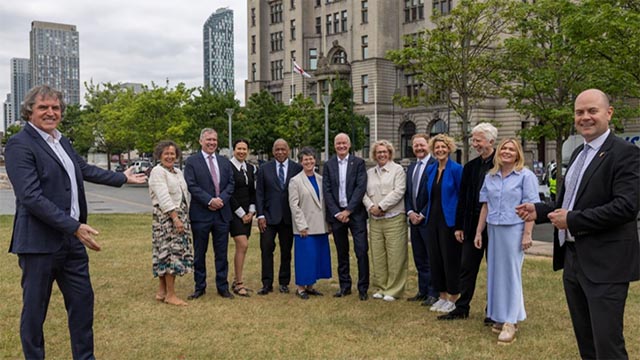Who should be responsible for regenerating the UK’s city centres? Our Manchester Question Time panel came up with several answers
The panel
Sir Howard Bernstein, chief executive, Manchester city council
Anne Fairhurst, real estate partner, ?Mills & Reeve
Derek Hatton, former deputy leader, Liverpool city council
Tim Newns, chief executive, Midas
Mat Oakley, head of European commercial property research, Savills
Colin Sinclair, director of property marketing, Bruntwood
The Estates Gazette Question Time roadshow rolled into Manchester in October. ?Mr Manchester, Sir Howard Bernstein, chief executive of the city council, was on our panel and inward investment, transport infrastructure and the high street were on the audience’s agenda.
“We place the airport, the university and other key assets at the heart of our strategy for technology, digital activities and life sciences, and there is strong evidence of increasing demand,” Bernstein said. “In turn, this fuels property and a wider critical mass of commercial and professional services, and that is what Manchester has got right.”
But Bernstein, the most respected local authority official around, was disparaging of central government’s local efforts. “Governments don’t get ‘place’. If they did, they would understand why we have a town centre crisis,” he said. “Now, we have to rethink the role town centres play in our economy. There are lots of opportunities for towns to reinvent themselves, as a result of the demand for value-driven space, workspace and small start-ups. The problem is that repopulating those town centres is left to local initiative, rather than being undertaken within a national framework.”
Colin Sinclair, director of property marketing at Bruntwood, drew a different distinction. “There are town centres and there are destinations,” he told the 100-strong audience. “The latter you go to for leisure, tourism, history, or maybe there is a university. The former are the problem, and there has to be a partnership between the local authority and the private sector to make a difference. Even the centres that can be transformed have probably got twice as many retail units as they really need, so people have got to be bold.”
Savills’ Mat Oakley was more direct, arguing that the solution was in the hands of the audience. “If everybody in this room went out tonight and spent £5 more than they were planning on spending, the high streets would reactivate,” said the agent’s outspoken head of European commercial property research. “We are confusing structural change with cyclical change. We have just been through the worst recession since the Second World War. People are spending less and practising precautionary saving. It will get better. Many of these streets will fill up naturally.”
Mills & Reeve real estate partner Anne Fairhurst reminded her fellow panelists that it is SMEs that lead economies out of recession, while former Liverpool council deputy leader Derek Hatton warned that the North West’s biggest challenge was “to make sure we are in a position strong enough to get the resources we need”.
After a lively hour-long debate, it fell to Midas chief executive Tim Newns to pinpoint the reason for Manchester’s success. “Let’s face it, what differentiates Manchester on a European level is the fact that we have access to a workforce of more than seven million people within a 50-mile commuter belt,” he said.
Members of the 100-strong audience quizzed the panel on the high street, transport and inward investment











